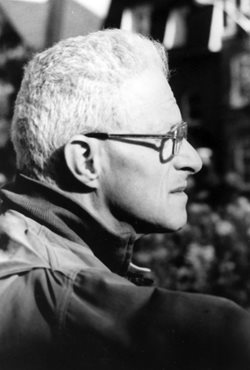Mathew Alpern
About Optica
In Memoriam: Mathew Alpern, 1920 - 1996
10 August 2022
 Mathew Alpern, recipient of the Edgar T. Tillyer Award (1974) and Physiologist, passed away on 16 May 1996 at the age of 75. He is most known for his research on color vision and color blindness.
Mathew Alpern, recipient of the Edgar T. Tillyer Award (1974) and Physiologist, passed away on 16 May 1996 at the age of 75. He is most known for his research on color vision and color blindness.
Alpern was born in Akron, Ohio on 22 September 1920. He received his Doctor of Optometry degree in 1941 from the Northern Illinois College of Optometry (now the Illinois College of Optometry). He spent a brief time in private practice before serving in the U.S. Army during World War II. Alpern then went to the University of Florida to receive his biomedical engineering degree, and then his Master of Science and PhD degrees in physiological optics from Ohio State University. In 1951, he began his academic career as an assistant professor of optometry at Pacific University in Forest Grove, Oregon. In 1955, Alpern was hired by Richard Blackwell to join the University of Michigan’s (U-M) faculty as an instructor in ophthalmology and research associate for their Vision Research Laboratory. Within a year, Alpern was promoted to Assistant Professor of Physiological Optics in the Ophthalmology Department. He remained at U-M for his entire career and quickly became one of the leading vision researchers in the world. In addition to color vision, Alpern worked on oculomotor responses and invented an electrophysiological technique called focal electroretinography, which allows the precise measurement of the electric response of the retinal cones for the diagnosis of various eye diseases.
Alpern was recognized for his many achievements. In 1978, he received the Edgar D. Tillyer Award from Optica for his distinguished work in vision, including (but not limited to) the optics, physiology, anatomy, and psychology of the visual system. In addition, he received the Jonas Stein Friedenwald Award from the Association for Research in Vision and Ophthalmology, the Research to Prevent Blindness Senior Scientific Investigator Award, the Charles F. Prentice Medal, and an honorary doctor of science degree from the State University of New York’s College of Optometry.
Optica, the scientific community, and his former students mourn his loss.
